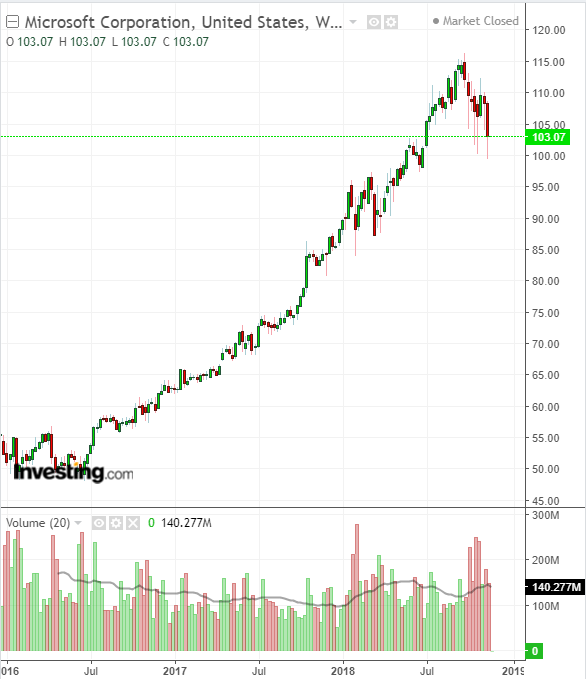For tech sector investors whose portfolios were heavily weighted in favor of FAANGs and other high-growth technology stocks, there hasn't been much to cheer about recently. The FAANG group, which includes Facebook (NASDAQ:FB), Amazon (NASDAQ:AMZN) and Apple (NASDAQ:NASDAQ:AAPL), are all in bear market territory, down more than 20% from their peaks this year.
For some high-profile tech stocks beyond the FAANGs, the picture is even bleaker. NVIDIA (NASDAQ:NVDA), one of the largest chip makers in the world and a former stock market darling, is leading losses in this sector, after dropping more than 50% since hitting its 52-week high in early October.

In an environment where fear rules and investors cash out of fundamentally strong stocks for irrational reasons, there are still some tech sector stalwarts worth considering. Indeed, Microsoft (NASDAQ:MSFT), whose shares closed at $103.07 on the final day of trading last week, has become even more attractive during the rout of the past two months.
Investing in the software giant now allows one to take advantage of the current weakness. And unlike some of its sector peers, Microsoft is in a much better position to withstand the worsening outlook for the top tech stocks.
Focus on Enterprise Business
One of Microsoft's key strengths is that it isn’t completely exposed to consumers. Unlike the social media giants, Microsoft mostly caters to demand from large companies that are spending aggressively on cloud computing and software.
While Facebook and Google (NASDAQ:GOOGL) confront the threat of government regulations after each suffered mass data breaches and used for political manipulation before and during 2018, Microsoft remains insulated from hacks as well as regulatory scrutiny. And unlike Apple, which has built its empire on the iPhone brand, Microsoft doesn't depend on one marquee product for revenue growth.
Thus, unlike Apple, which is now under pressure after analyst predictions point to a slowdown in demand for its flagship product in 2019, the majority of Microsoft's business increasingly comes from subscription-based cloud services or corporate software, delivered to businesses via multi-year deals. Buttressing the case for Microsoft: spending on enterprise software is expected to rise 8.3% in 2019, making this the fastest growing segment within information technology, according to projections from Gartner Inc.
In its Q1 2019 earnings report, released at the end of October, Microsoft’s sales popped 19% from the same quarter a year ago, to $29.08 billion. Net income jumped 34% to $8.82 billion, or $1.14 per share.
The company's Intelligent Cloud segment, which includes Azure and server products, grew 24% to $8.57 billion, about $300 million above analyst expectations. As well, many analysts believe Microsoft will further solidify its position in the cloud business in 2019. All told, there's no reason for bearish sentiment on the company at a time when its turnaround strategy has clearly started paying off.
Solid Dividend Payer
In a KeyBanc survey of chief information officers, conducted in September and cited by Bloomberg, 44% of respondents said they plan to increase their cloud spending with Microsoft in the next six months, versus 7% for Google. Adding to all this forward-looking optimism and making Microsoft even more attractive during these times of market distress, it pays a rock-solid dividend.
During market downturns, companies that pay regular dividends are generally in a much better position to withstand the selling pressure than those that don’t. Dividend paying stocks are also less volatile in bear markets since investors are less likely to divest the recurring income they provide.
On this particular metric Microsoft has an excellent track record. Since 2004, when it first began paying dividends, the company’s payout has swelled by 425%. The continued dividend growth has been supported by a low payout ratio of 40.61 and strong underlying businesses. Currently Microsoft's annual dividend yields 1.79% which translates into a quarterly dividend of $0.42 per share.
Bottom Line
Microsoft shares are down 11% from the stock's 52-week high, trimming 2018 gains to 20%. That drop, though much smaller than for other tech giants, has made Microsoft valuations quite compelling for long-term investors.
It wouldn't make sense to assume that a company the size of Microsoft will continue to see growth at a pace seen in 2018. However, in our view, it’s still a relatively safer bet compared to other consumer-focused tech stocks.
At a time when macro risks are increasing and investors are looking for a shelter, Microsoft’s growth engine and solid dividend make it a logical pick for any buy-and-hold portfolio.
